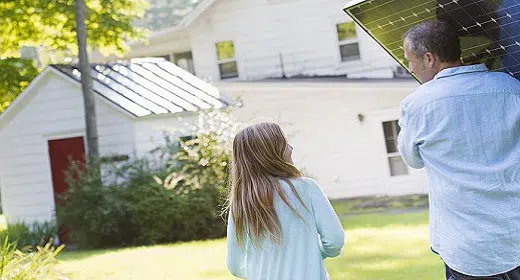While the many benefits of solar energy are well-touted, there are also high upfront costs associated with installing a home renewable energy system. At the end of the day, are solar panels worth it?
The truth is, purchasing a solar panel system isn’t right for every home. At its best, solar allows you to reduce your environmental footprint, offset your monthly energy bills and increase your independence from your local utility company. With rising energy rates and the price of modern solar being as low as it is, the cost of doing nothing usually turns out to be greater than the cost of purchasing solar.
With the wrong home, however, panels might not generate enough energy to be worth the cost. So, how can you tell if solar panels are worth it for you? In this article, we’ll review the factors that determine solar panel costs, system longevity and return on investment (ROI) to help you confirm if you’re a good candidate for solar or if you should hold off.
When considering an investment in solar panels, it helps to know how much your initial costs would be. You can start getting free, no-obligation quotes from top solar companies in your area by using this tool or filling out the 30-second form below.
Is Solar Worth It? Think Location…
The primary factor determining solar’s value will be your location. Evaluating location goes beyond just how much sunlight your region receives, factoring in your electricity costs, the cost of solar by state, local solar incentives and more.
Solar Panels Are Worth It For You If…
Solar panels tend to be a better investment for homeowners who meet the following criteria:
- Your house receives a lot of sunlight: If you live in a part of the country that gets lots of exposure to sunlight throughout the year, then you’ll probably get more mileage out of your solar panels. It’s little wonder that solar power is most popular in places like Arizona, Texas and California. If your home is covered by too much shade from trees or other homes, the solar panels probably won’t generate enough energy to be worth the investment.
- You have proper space on your roof: A good solar system will require plenty of surface area on your roof, unobstructed by skylights, chimneys or other fixtures. With a smaller roof, you can still potentially install a system, but you’ll need to find the most efficient solar panels (which are often more expensive) to maximize your limited space. Roofs with steeper slopes will be more difficult for technicians to install the panels on and may result in higher labor costs as well.
- Your roof faces south or west: Homes with roofs facing south, southwest or west will receive more direct radiation from the sun (at least in the northern hemisphere), resulting in more energy generated by a panel. Most solar companies will evaluate the angle of your roof via satellite imagery and check irradiation maps to calculate how effective a solar system would be for your home.
- You have high electricity bills: The amount of money you save by going solar will be directly proportional to the amount you spend each month on electrical costs. So, if you live in a community where the price of electricity is pretty high, you stand to achieve greater savings when you go solar.
- Your state or city has solar incentives, rebates or tax exemptions: This factor can be a sneaky determinant of the value of solar panels. Net metering specifically can have a great impact on the value you receive for your solar energy. If your local utility has high feed-in tariffs or a low buyback rate for your energy, it might be best to hold off on installing solar until renewable energy policies become more standardized.
Solar Panels Are Not Worth It For You If…
By contrast, you may not be as well-positioned for a high solar-power ROI if you fit any of the following criteria.
- Your home doesn’t get enough sun exposure: If you know anything about how solar panels work, it won’t be a surprise that darker areas benefit a bit less from this renewable energy source. If your roof tends to be shaded for long stretches of the day (for example, if your home is in the shadow of a larger building or a lot of dense trees), then your solar panels may not get the sun exposure they need to generate a solid ROI. That being said, solar panel efficiency in cloudy regions may surprise you and — fun fact — solar panels are actually slightly more effective in the cold.
- You’re ineligible for incentives and rebates: Certain municipalities and utility companies offer incentives on top of the federal tax credit, which can have a big impact on your solar payback period. If your local government or power company doesn’t have its own incentives, or has a poor or non-existant net metering policy, a solar investment may not be worth it for your home.
- You have low costs for electricity: If your electrical bills are already fairly minimal, then installing a residential solar system will yield more modest savings.
- You don’t have the right kind of roof: Certain types of roofs just aren’t as well-suited for solar power installation. For example, older or historic homes, homes that have overly tiled roofs and homes that have larger skylights may not be good matches for solar energy. Homes that aren’t facing the best direction for solar exposure may not be the best candidates.

Irradiance maps showing the amount of sunlight hitting roofs that face south and southwest, vs other directions. The brighter the yellow, the more solar energy is received.Google Project Sunroof
How Much Do Solar Panels Cost?
Even though the price of solar has dropped far more quickly than expected, a residential solar energy system is still a significant investment. As with an investment of any other nature, solar panels come with the expectation of a positive return in the future. Saving money on your monthly electric bills will help balance out the installation costs, and incentives are typically available to help undercut the cost of solar panels (more on that in a moment).
Your total solar energy system cost will depend on a handful of factors, mainly:
- The type of solar panels you choose
- The number of solar panels required for your home
- Your solar panel installation company
- Add-ons like a solar battery or electric vehicle charger
- Labor costs (e.g., homes with complex roofs may require more labor, therefore a higher labor cost)
With that said, according to Sunrun, the average cost of installing solar panels in 2021 is between $12,000 and $16,000 after the solar tax credit.
Check out our piece on the cost of solar panels to learn more.
The Cost of Solar Panels Vs. The Cost of Doing Nothing
Sticker shock can be common when looking at solar proposals. But it’s important to understand that by purchasing a solar system, you’re essentially paying for 25 years of electricity upfront. So make sure to think about what you’d spend on future utility bills to see whether solar panels are worth it for your home.
For example, taking an average monthly electricity bill of $125 (about how much I pay per month in Louisiana), I could theoretically expect to spend $46,837 on conventional energy over the next 25 years if utility rates continue to increase around 1.8% each year, the current average according to the EIA.

EcoWatch
To put this in perspective, based on the average cost of solar per watt in Louisiana, a solar system that offsets my energy usage would cost around $15,214 after the tax credit (see how we calculated this).
Granted, not all solar systems will offset 100% of your energy use each month, but a modest solar array can be expected to offset at least 50-75% when properly designed and installed. How does that compare to spending $50,000 on dirty and unreliable energy over the next few decades?
Offsetting Solar Panel Costs
Another big driver of solar’s growth are the federal and state-specific solar programs deployed to provide financial assistance for solar installations. These programs include local and federal tax credits and other rebates. Top solar companies should be able to help you identify and apply to any programs you are eligible for. These incentives have proven effective in areas like the Northeast, which may not be known for their sunshine but have made the benefits of solar available to a wide demographic.
The current federal solar investment tax credit (ITC) provides a 26% credit for systems installed through the end of 2022. State incentives can be added on top of this for even more savings. Rather than cutting down the initial cost of solar, most statewide incentives focus more on rewarding you for the solar energy that your home produces to accelerate your ROI. You can learn more about your state’s incentives by searching the DSIRE database.
How Long Do Solar Panels Last?
As you think about the initial startup investment in solar panels, another question to consider is system longevity. After you buy solar panels, how long do they last? Will they function long enough for you to get your money’s worth?
Again, the answer can vary slightly depending on the specific type of solar panels you choose. As a rule of thumb, however, most residential solar systems last between 20 and 30 years and require minimal maintenance and upkeep. Most of the best solar panels come backed with strong warranties, ensuring your system produces as expected for at least two decades. Of course, when purchasing a solar panel system, you’ll want to take a close look at the warranty information offered.
The longevity of your system is also important, as solar adds to the value of your home. According to the U.S. Department of Energy, buyers nationwide have been willing to pay an average premium of about $15,000 for a home with a solar array. In many cases, that alone can cover most of all of your solar investment.
How Much Money Will You Save With Solar Panels?
One of the most common questions surrounding solar energy is: How much will you save with solar? Naturally, this depends on your energy needs, location, solar loan interest rates (if applicable) and budget. However, the average solar panel payback period (meaning how long it takes to make back your initial investment) is between five and 10 years.
When determining whether solar panels are worth it for your home, keep in mind that your savings will be greater if you live in an area where electricity rates are higher; by contrast, if you live somewhere with a lower cost of electricity, the money you save using clean energy will be lesser.
How to Determine Your Savings With Solar
The very best way to get a concrete understanding of whether solar panels are worth it for you is to consult with a solar panel installation company near you. Most energy consultations are free and no-pressure. Any reputable installer will provide you with:
- An initial assessment of your roof, its positioning in relation to the sun, your energy costs and your location
- An estimate of the cost of your solar system
- An estimate of how much money you can expect to save over your system’s lifetime
So, Is Solar Really Worth It?
When installations are assessed, designed and performed properly, solar energy is one of the best investments you can make. Solar panels are worth it for the majority of customers in the country, but there are certainly some disqualifiers, as described above.
Given the current price of solar energy (and its 82% drop over the past decade) and an expiring solar tax credit, we predict 2022 will be one of the best times to go solar. Those waiting for prices to drop further may be disappointed when either the tax credit expires or solar prices stabilize due to booming demand.
FAQ: Are Solar Panels Worth It?
Do solar panels really save you money?
In most cases, solar panels really do save you money. There are, however, cases in which roofs are unfit for solar panels or are covered by too much shade and prove uneconomical. The best way to assess whether your home is a good match for solar panels is to get an estimate from a solar installer near you.
What are the main disadvantages of solar?
Solar panels are not a perfect energy source for everyone. Disadvantages include lower efficiency when facing a direction besides south or west, potential complications with a solar lease or loan when selling a home, and upfront costs that can price out certain demographics. To see if solar panels would be advantageous to you, we recommend reaching out to a local solar provider.
Are solar panels worth it in 2021?
Generally speaking, solar panels are worth it in 2021. The cost of solar is near all-time lows despite supply chain issues, and the federal solar tax credit is still in effect until the end of 2022. However, there are a few disqualifiers for solar customers, such as too much shade over a roof, too little space on a roof or energy bills that are already too low to justify the purchase.
Karsten Neumeister is a writer and renewable energy specialist with a background in writing and the humanities. Before joining EcoWatch, Karsten worked in the energy sector of New Orleans, focusing on renewable energy policy and technology. A lover of music and the outdoors, Karsten might be found rock climbing, canoeing or writing songs when away from the workplace.










































